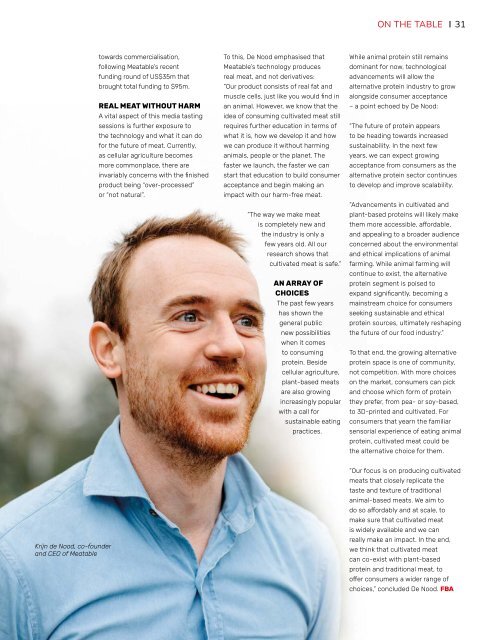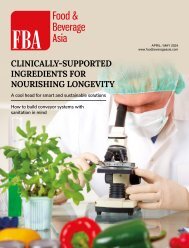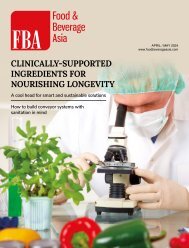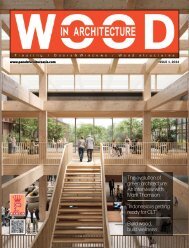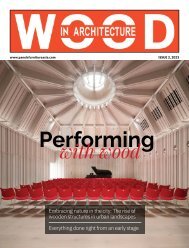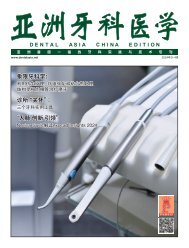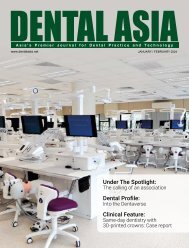Food & Beverage Asia December/January 2024
Food & Beverage Asia (FBA) is the leading source of food and beverage news in Asia since 2002. FBA delivers a comprehensive view of the food and beverage landscape, spanning across the latest health and nutrition trends and industry innovations in ingredients, recipe formulations, food science, sustainability, packaging, and automation, as well as advancements in agri and food-tech.
Food & Beverage Asia (FBA) is the leading source of food and beverage news in Asia since 2002. FBA delivers a comprehensive view of the food and beverage landscape, spanning across the latest health and nutrition trends and industry innovations in ingredients, recipe formulations, food science, sustainability, packaging, and automation, as well as advancements in agri and food-tech.
Create successful ePaper yourself
Turn your PDF publications into a flip-book with our unique Google optimized e-Paper software.
ON THE TABLE<br />
31<br />
towards commercialisation,<br />
following Meatable’s recent<br />
funding round of US$35m that<br />
brought total funding to $95m.<br />
REAL MEAT WITHOUT HARM<br />
A vital aspect of this media tasting<br />
sessions is further exposure to<br />
the technology and what it can do<br />
for the future of meat. Currently,<br />
as cellular agriculture becomes<br />
more commonplace, there are<br />
invariably concerns with the finished<br />
product being “over-processed”<br />
or “not natural”.<br />
To this, De Nood emphasised that<br />
Meatable’s technology produces<br />
real meat, and not derivatives:<br />
“Our product consists of real fat and<br />
muscle cells, just like you would find in<br />
an animal. However, we know that the<br />
idea of consuming cultivated meat still<br />
requires further education in terms of<br />
what it is, how we develop it and how<br />
we can produce it without harming<br />
animals, people or the planet. The<br />
faster we launch, the faster we can<br />
start that education to build consumer<br />
acceptance and begin making an<br />
impact with our harm-free meat.<br />
“The way we make meat<br />
is completely new and<br />
the industry is only a<br />
few years old. All our<br />
research shows that<br />
cultivated meat is safe.”<br />
AN ARRAY OF<br />
CHOICES<br />
The past few years<br />
has shown the<br />
general public<br />
new possibilities<br />
when it comes<br />
to consuming<br />
protein. Beside<br />
cellular agriculture,<br />
plant-based meats<br />
are also growing<br />
increasingly popular<br />
with a call for<br />
sustainable eating<br />
practices.<br />
While animal protein still remains<br />
dominant for now, technological<br />
advancements will allow the<br />
alternative protein industry to grow<br />
alongside consumer acceptance<br />
– a point echoed by De Nood:<br />
“The future of protein appears<br />
to be heading towards increased<br />
sustainability. In the next few<br />
years, we can expect growing<br />
acceptance from consumers as the<br />
alternative protein sector continues<br />
to develop and improve scalability.<br />
“Advancements in cultivated and<br />
plant-based proteins will likely make<br />
them more accessible, affordable,<br />
and appealing to a broader audience<br />
concerned about the environmental<br />
and ethical implications of animal<br />
farming. While animal farming will<br />
continue to exist, the alternative<br />
protein segment is poised to<br />
expand significantly, becoming a<br />
mainstream choice for consumers<br />
seeking sustainable and ethical<br />
protein sources, ultimately reshaping<br />
the future of our food industry.”<br />
To that end, the growing alternative<br />
protein space is one of community,<br />
not competition. With more choices<br />
on the market, consumers can pick<br />
and choose which form of protein<br />
they prefer, from pea- or soy-based,<br />
to 3D-printed and cultivated. For<br />
consumers that yearn the familiar<br />
sensorial experience of eating animal<br />
protein, cultivated meat could be<br />
the alternative choice for them.<br />
Krijn de Nood, co-founder<br />
and CEO of Meatable<br />
“Our focus is on producing cultivated<br />
meats that closely replicate the<br />
taste and texture of traditional<br />
animal-based meats. We aim to<br />
do so affordably and at scale, to<br />
make sure that cultivated meat<br />
is widely available and we can<br />
really make an impact. In the end,<br />
we think that cultivated meat<br />
can co-exist with plant-based<br />
protein and traditional meat, to<br />
offer consumers a wider range of<br />
choices,” concluded De Nood. FBA


